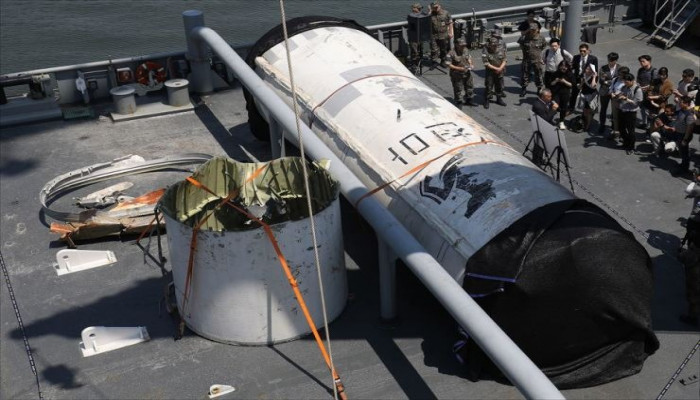South Korea retrieves North Korean military satellite wreckage from Yellow Sea
- In Reports
- 12:21 PM, Jul 05, 2023
- Myind Staff
In a significant development, South Korea has announced the successful recovery of North Korean spy satellite wreckage from the sea near its coast. The satellite, launched on May 31, encountered a failed takeoff and subsequently sank into the sea. While this retrieval can be seen as a notable intelligence achievement for Seoul, experts have assessed the object to possess limited military significance.
Earlier last month, the South Korean military announced the recovery of parts from the rocket employed in the unsuccessful launch.
"After detailed analysis on major parts of North Korea's space launch vehicle and satellite which were salvaged, South Korean and U.S. experts have assessed that they had no military utility as a reconnaissance satellite at all," the military said in a statement.
The South Korean military has concluded its salvage operation after successfully recovering the wreckage of the satellite. The operation was initiated shortly after the object sank into the Yellow Sea, just off the west coast of South Korea. According to officials, this marks the first instance of South Korea obtaining vital components from North Korea's military satellite.
According to Reuters, the involvement of the South Korean Navy and deep-sea divers was crucial in the endeavor to retrieve the wreckage. The ongoing salvage operation holds the potential to assist Seoul in gathering additional evidence related to potential sanction violations by Pyongyang concerning the procurement of satellite manufacturing equipment.
Furthermore, the recovered wreckage may offer valuable insights into North Korea's enigmatic rocket program and its plans to deploy spy satellites targeting US, Japan and South Korea.
Amidst the presence of substantial US military personnel in South Korea and Japan, North Korea has declared its intent to deploy spy satellites with the aim of monitoring military installations in these regions. Despite being bound by United Nations Security Council resolutions that prohibit ballistic missile tests, North Korea has persistently asserted its right to pursue a civilian space program for satellite launches.
However, concerns have been raised by the United States and its allies regarding North Korea's space program, as they caution that the technological advancements made through this program could potentially be leveraged to bolster the country's ballistic missile capabilities.
Under the leadership of Kim Jong Un, North Korea has been significantly ramping up its endeavours to improve the indigenous technology and components utilized in its latest generation of missiles.
However, despite its intensified efforts, North Korea continues to depend on external sources for specific materials and components crucial to its missile development. International sanctions, imposed in response to the country's pursuit of nuclear weapons and ballistic missile systems, have hindered its ability to acquire such necessary resources.
Image source: The Korean Times







Comments